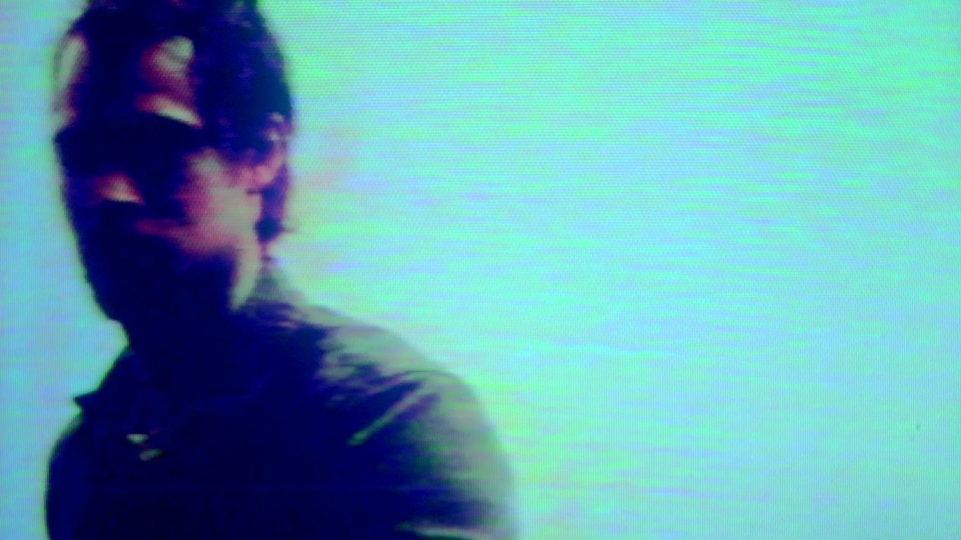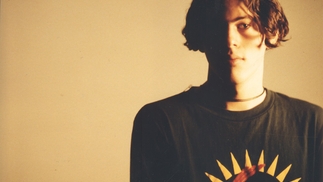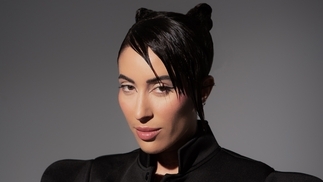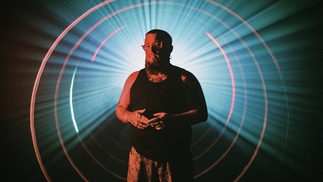Bjarki Is bringing Icelandic techno down to earth

Iceland’s Bjarki is so obsessed with making music, he’s forced himself to stop for a little while. Ahead of his new album ‘Happy Earthday’ which synthesises his passion for ambient, weird electronics and breakbeats, the cult producer opens up about his love of the natural world, conquering his demons, and how he swerves the conventional path...
Bjarki sighs deeply. “I had to try and escape.” Years of writing 10 tracks a day has taken its toll, and he’s finally reached breaking point. After 48 hours spent tracking him down, we eventually speak to the serious-natured Icelander in Brazil over an iffy internet connection, just before he heads into the Amazon. It’s somewhere he won’t be able to make music, however much he wants to. And that’s exactly the point.
To this 28 year old, born Bjarki Runar Sigurðarson, making music has been an obsession, a way of escaping, a sense of therapy ever since his teenage years. He’s followed the same routine, day in, day out, and it only accelerated after 2015 when he was signed by Nina Kraviz for her Trip label. “I need to stop for my health,” he deadpans, despite admitting that making music is also what keeps him sane. “Being constantly in the studio is kind of unhealthy. You don’t do anything else.”
It was on New Year’s Day that he realised. He played a gig at De School in Amsterdam. It “went well” and “was great”, but he ”kind of hated it”, because he didn’t sleep for 24 hours either side of the set. “I worked on music all the way to and from the sound-check, and thought, ‘Shit, I’m getting old, I can’t do this any more. It’s pain. I’m not a kid’.” He talks about making music in perfect English, but with an American lilt, and there is an almost palpable sense of pain in his voice when he does: it’s what he loves to do, but it’s also torturing him.
“Some people are just in their heads all the time, I guess,” he says of why he feels he has to do it. Recently he says he got asked if he felt completely free in Iceland, a famously prosperous, peaceful and sparsely populated nation. “And I was like... free? What is freedom? Am I really free? Making music or creating, that’s when I feel free. If I don’t create, I go mad. I don’t know what to do with myself.” When his mind wanders and goes into overdrive, anxiety kicks in. “At the end of it all, we’re just a bunch of atoms and molecules interacting according to arcane mathematical rules. Our thoughts, our mind, our brain is our prison.”
In order to stay out of his mental jail, these days Bjarki is trying to read more, research, “all kinds of things about the environment and nature’s law,” as well as eat more cucumber, drink more water and cut out all cheese. “I’ve never spoken about this before, but there was a point where I didn’t eat at all. When I’m making music, I’m basically always hungry. As soon as you eat, your energy changes, your focus is lost, and the moment is gone.”
EXPECT THE UNEXPECTED
This unhealthy addiction to making music is what made Bjarki one of techno’s most thrilling new names. He first surfaced as Kid Mistik near the end of the 2000s, and even played Tresor in 2013, but signing a wealth of material to Nina Kraviz’s Trip made him popular. At one point, he released three albums in as many months on the label. From IDM to frosty techno, jungle to breakbeat and naturalistic ambient, he is as hard to predict as he is unconventional. “I always try to give people something to think about: phasing, manipulating frequencies, or whatever,” he says.
His club shows, meanwhile, are always high-octane, strobe-lit affairs. As a low-key character, he likes to take the attention off himself by having one of his friends on-stage, dressed head-to-toe in a face covering and creepy white Lycra suit, dancing next to battered old mannequins. Instead of heads, they have TVs displaying flickering images of featureless faces. “If I didn’t have friends I could involve in my work, I wouldn’t want to do anything. I would probably just be working in some job,” he says.
Because of his generally reclusive nature, there is something of a cult around Bjarki, much like there is around Aphex Twin. His biggest tune, with more than four million views on YouTube, was the mutant hard techno banger ‘I Wanna Go Bang’. It was the underground hit of 2015, and was actually written when the artist was 19. “I have like 14 more of these big room sounds, but why would you release them?” he says, sounding unmoved by its success. “One is enough.”
As an insular, deep-thinking person, it’s no real surprise Bjarki finds such solace in the studio. It acts like a confession room — so much so that he was initially unsure about exposing some of the “vulnerable moments and emotions” that he does on ‘Happy Earthday’, his first “proper album” on !K7. When he first sat down to write it, he hired a fancy studio. But it didn’t work. He didn’t feel at home. Instead, he mined the vast reserves of music he’s built up over many years and put together his most coherent and personal body of work from an original shortlist of 30 tracks (including one he heard in a mate’s car, which had been lost but for the copy on his iPod: they cracked it to get to the music).

Flurries of drum blizzards, razor-sharp percussion, and plenty of sombre synth work make it an absorbing and cathartic listen that manages to be visceral yet cerebral as it spans a wide range of moods and tempos. At times, it sounds like a field recording of the deep ocean, with pained whale cries and glistening beams of light penetrating the surface. At others, it’s a blissful fusion of soft-edged hardcore, Aphex Twin complexity and Arthur Russell weirdness. It ebbs and flows like the sea; riding on the crest of an exhilarating breakbeat wave one moment, then floating free in an expansive ambient abyss the next.
“When I understand things, I tend to not like them,” he says of the music he loves by Aphex Twin, Autechre and Throbbing Gristle. “As a kid, I hated computer games. They pissed me off. I got so depressed ’cause you always know how they will end, they all lead to the same horizon.” A tendency towards chaos permeates his music, which rarely stays the same from one release to the next. Even his own sets are wilfully different each and every time: Bjarki insists on writing up to five new tracks for every single one, and rarely plays them more than twice. “It must suck to go to my concerts if you like my releases, because you won’t hear them,” he says. “It’s like going to a Metallica concert where they play all the new stuff. People get furious.”
VISUAL ART
Repetition is the reason he never wanted to pursue playing in a band, despite doing so as a child. He says he was such a bad drummer he rewrote songs or improvised to make them more playable. As soon as a new kid started at school who could actually play, his bandmates “were so happy someone could keep rhythm,” he went out and bought a drum machine, preferring its fatter electronic sounds and wider possibilities.
At that point, aged 16 and diagnosed with ADHD, he was living with his father, who was trying, but failing, to make young Sigurðarson into a better student at school. He had been making music since the age of 12, experimenting with Fruity Loops and other bits of software — aping trance and Chemical Brothers, then preferring harder techno than was popular at the time — but never saw it as something he wanted to do with his life. “It will always be my hobby,” he says. But the reality is, that changed when Nina Kraviz, playing locally, was handed a USB full of Bjarki tunes by his girlfriend. He cautiously reveals that at that point he wanted to get into making films, but music took off.
Now, four years later after making necessary changes for the sake of his own sanity, he finds himself turning out more canvases than he does tunes. “I recently got into painting, and I paint all kinds of things that pop into my mind. I’m just learning and trying to put what I have inside down. All sorts of shit: a bit of sci-fi, abstract, some faces, but I realise I have my favourite colours, and now I’m completely organising my whole life with them, and it’s really interesting.”
This intense, obsessive nature carries over to everything he does. ”Some people have x amount of energy and spend it equally on everything, but when I clean the toilet, I do it 100%. I can’t do it shit. It’s the same with painting: when I start, I can’t stop.” By now, Bjarki knows that he can stifle his internal demons with art and music. Away from that, topics like ocean polluting micro-plastics, the endless amounts of toxic waste humans create and busy European cities all get him quickly worked up.
“I don’t know what happiness is,” he says, admitting that friendships and relationships have suffered because of how much time he has poured into music. Once, he stayed in a Berlin basement for weeks without leaving. “It’s not really selfish,” he says. “You have to love yourself, but people have to learn that. I don’t think I love myself that much, which is why I love music, it’s been like my mosque, my church, where I can be in control and do my own thing — my own way. It’s a place where I can set up my emotions, write them out. It took years to get to the point where I am now, where I’m really satisfied and fulfilled with the results, so that I walk out of the studio like a new man, like I’ve been baptised. It’s like a whole ceremony, and has only been like this since about 2012, maybe.”
Though he repeatedly says he doesn’t care about fame, environmental issues are dear to him. He says he wants to wage his own personal war on single-use plastic, rather than shout about it on Facebook, which he is “so against” and which he thinks people only do “to fuel themselves without actually doing anything about it”.

He promises he won’t turn “insane like Morrissey” on the topic, but does tell the story of a club posting that they had banned plastic straws, only for him to turn up and see them all over the bar. The owner maintained they were paper, so Bjarki “took a bite off a handful of them and ate them, and of course they were fucking lying”.
Because music is primarily a coping mechanism for Bjarki, it seems possible he might one day just pack it all in and walk away. “I hope so, I really hope so,” he says, as if talking about a star-crossed lover. “But I don’t see that happening at all. My focus now is to understand nature. People have to understand nature to understand themselves.”
Beyond exploring the Amazon, he refuses to say much about his future plans, other than that a new audio-visual show is in the works. Next to that, his hope is to disappear into anonymity again, to recapture the pressure-free purity of his youth, and play some secret raves under a name no one knows. “If something gives me energy, I’ll do it, because I don’t think I’ll sit around in my studio counting my dollars for the rest of my life. I don’t wanna do that at all.”





